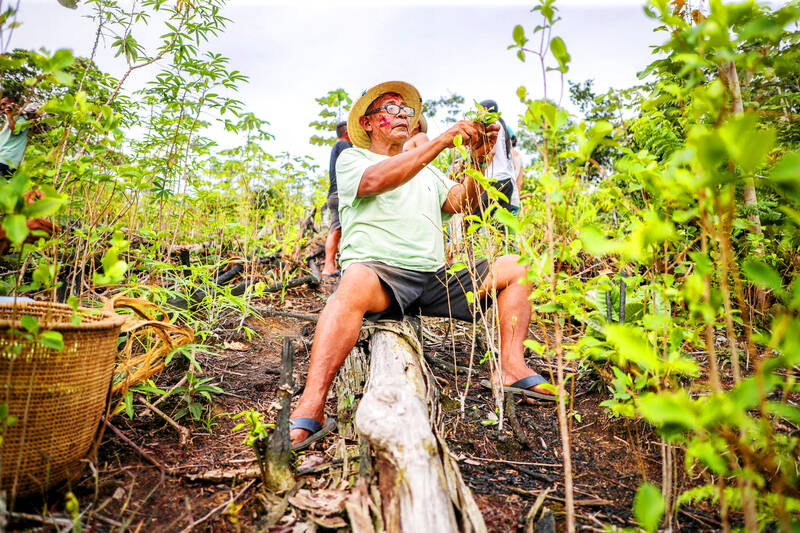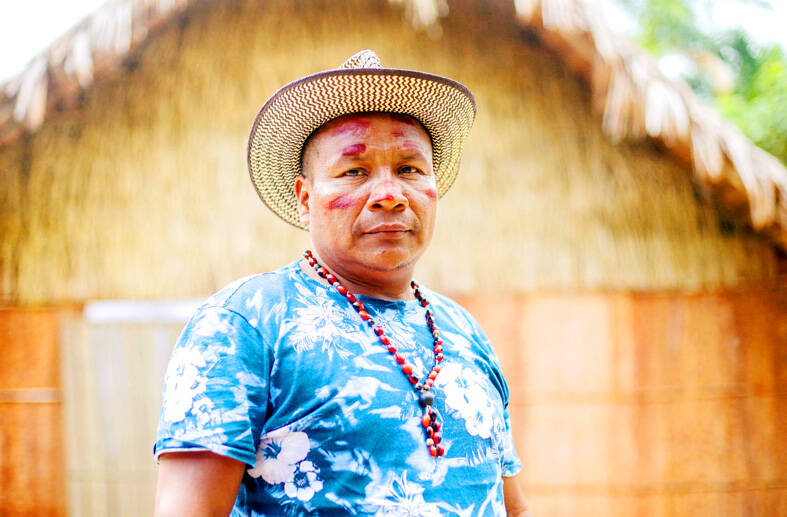Chewing on psychoactive coca leaves in a traditional ritual, Colombian indigenous leader Fabio Valencia seeks the advice of jungle spirits and ancestors about a project sold to his community as a planet-saving initiative.
In a remote corner of the Amazon, far from the COP28 climate summit in Dubai where world leaders are thrashing out the final parameters for a reform of the global carbon credit system, the 43-year-old said that one such project was destroying his people in the region of Pira Parana.
Carbon credits allow companies to buy carbon credits from forest preservation or other projects to offset or “compensate” for their greenhouse gas emissions.

Photo: AFP
Yet Valencia said the Baka Rokarire project in Pira Parana is “worse” for the community than even pollution from mining and oil extraction.
It is threatening the very fiber of the community, he said, fraudulently wresting control from the region’s indigenous leadership and driving a wedge between locals who support the project with its quick cash injection, and those against it.
“This contaminates spiritually, physically, it destroys everything ... in this territory, for money,” Valencia said.

Photo: AFP
Agence France-Presse walked, motor-boated and flew over part of the Pira Parana territory, which is nearly the size of Puerto Rico. It is an area so remote it is accessible only by million-dollar private flights or a boat trip of at least six days from the nearest city, Mitu.
A total of 2,246 members of six tribes in Pira Parana are contracted to the Baka Rokarire project to reduce deforestation in Pira Parana. It is the type of carbon credit project known as REDD+, which stands for “Reducing Emissions from Deforestation and Forest Degradation.”
Trees are crucial absorbers of carbon dioxide — the most widespread greenhouse gas — and Colombia, one of the world’s most biodiverse countries, has tens of millions of hectares of forest.
However, local leaders say they wish they had never heard of Baka Rokarire, which they say was illegally foisted on them.
They cite an increase in disputes between individuals and groups and a loss of indigenous autonomy in the region.
Valencia said there had been a sudden rise in alcohol consumption — anathema in a region with a deeply traditional way of life.
AUTONOMY THREATENED
Masbosques, a public-private sustainable forest management partnership, states on its Web site that Baka Rokarire protects more than 702,000 hectares of Colombian Amazon, with an estimated annual emissions reduction of 524,146 tons (475,497 metric tonnes) of carbon dioxide equivalent.
However, some say charge that the Baka Rokarire project is a farce as there is no real deforestation threat in the area and thus no emissions “savings” to be made.
Inhabitants of Pira Parana further accuse Masbosques of having hoodwinked the community when it acted as an intermediary in a carbon credit deal with a private company.
They have referred the matter to the Constitutional Court in the first case of its kind in Colombia, claiming violations of their rights to territorial autonomy and self-government. The matter is pending.
Valencia, a leader of the Makuna people, sais that Masbosques negotiated a deal with a community member who had no legal power to take such decisions.
The prosecutor’s office is also investigating claims that Masbosques falsified documents related to the deal signed in 2021.
Masbosques, which describes itself as a not-for-profit organization, said that the contract was “valid, legal,” and that it was the victim of a “smear campaign.”
The credits were sold to a Colombian data processing firm called Latin Checkout for about US$3.8 million — all of which went to community members, representatives and organizations, Masbosques said.
According to www.ecoregistry.com, which keeps tabs on carbon credit trading, Latin Checkout then sold the credits to Delta Air Lines, which faces a lawsuit in the US for alleged “greenwashing” — claiming to be carbon neutral, while purchasing questionable carbon offsets.
Indigenous leader Wilmer Garcia said that he was one of many community representatives never consulted on the deal.
“The company [Masbosques] ... invaded this territory. It did not recognize that there are already environmental and traditional authorities here,” the 37-year-old said.
Traditional leader Roberto Marin, 58, said that the project was never approved in the maloka — an indigenous council that has the final say on such matters.
“It must be recognized that we exist here, people, human beings with rights,” he said.
A similar project elsewhere in Colombia was stopped by a judge on the grounds that the community was not adequately consulted.
‘TAKING ADVANTAGE’
Colombian Minister of Environment and Sustainable Development Susana Muhamad said that a “lack of regulation” meant carbon credit projects are negotiated between private parties with no government control or participation.
This has given rise to “some companies taking advantage of some communities,” she said, adding that there were plans for the creation of a regulatory agency.
Colombia’s Sinchi Amazonic Institute of Scientific Research says that about two-thirds of indigenous territory in the rainforest fall under carbon credit projects today.
The Paris Agreement that emerged from COP21 in 2015 widened a system of exchange of carbon credits — something the oil and gas industry had been demanding for years.
The details of the system have yet to be finalized, but the very concept took a major hit this year with several scientific studies and investigative reports questioning the credibility of the lucrative voluntary market which lies outside the UN process.
“Many of these populations have experienced a long history of conflict with extractive industries. In some cases, the offset income can help support them... But we’ve seen many projects ... putting at risk some of the most vulnerable communities on the planet,” researcher and Berkeley Carbon Trading Project director Barbara Haya said earlier this year.

The US dollar was trading at NT$29.7 at 10am today on the Taipei Foreign Exchange, as the New Taiwan dollar gained NT$1.364 from the previous close last week. The NT dollar continued to rise today, after surging 3.07 percent on Friday. After opening at NT$30.91, the NT dollar gained more than NT$1 in just 15 minutes, briefly passing the NT$30 mark. Before the US Department of the Treasury's semi-annual currency report came out, expectations that the NT dollar would keep rising were already building. The NT dollar on Friday closed at NT$31.064, up by NT$0.953 — a 3.07 percent single-day gain. Today,

‘SHORT TERM’: The local currency would likely remain strong in the near term, driven by anticipated US trade pressure, capital inflows and expectations of a US Fed rate cut The US dollar is expected to fall below NT$30 in the near term, as traders anticipate increased pressure from Washington for Taiwan to allow the New Taiwan dollar to appreciate, Cathay United Bank (國泰世華銀行) chief economist Lin Chi-chao (林啟超) said. Following a sharp drop in the greenback against the NT dollar on Friday, Lin told the Central News Agency that the local currency is likely to remain strong in the short term, driven in part by market psychology surrounding anticipated US policy pressure. On Friday, the US dollar fell NT$0.953, or 3.07 percent, closing at NT$31.064 — its lowest level since Jan.

The New Taiwan dollar and Taiwanese stocks surged on signs that trade tensions between the world’s top two economies might start easing and as US tech earnings boosted the outlook of the nation’s semiconductor exports. The NT dollar strengthened as much as 3.8 percent versus the US dollar to 30.815, the biggest intraday gain since January 2011, closing at NT$31.064. The benchmark TAIEX jumped 2.73 percent to outperform the region’s equity gauges. Outlook for global trade improved after China said it is assessing possible trade talks with the US, providing a boost for the nation’s currency and shares. As the NT dollar

The Financial Supervisory Commission (FSC) yesterday met with some of the nation’s largest insurance companies as a skyrocketing New Taiwan dollar piles pressure on their hundreds of billions of dollars in US bond investments. The commission has asked some life insurance firms, among the biggest Asian holders of US debt, to discuss how the rapidly strengthening NT dollar has impacted their operations, people familiar with the matter said. The meeting took place as the NT dollar jumped as much as 5 percent yesterday, its biggest intraday gain in more than three decades. The local currency surged as exporters rushed to